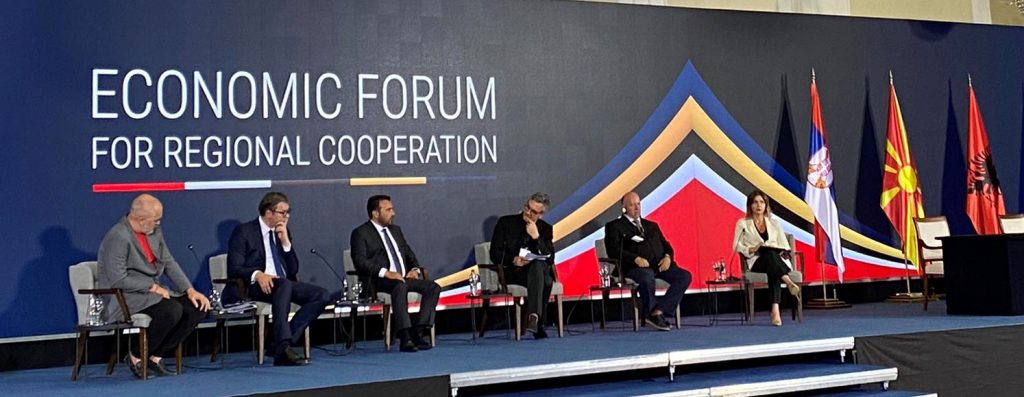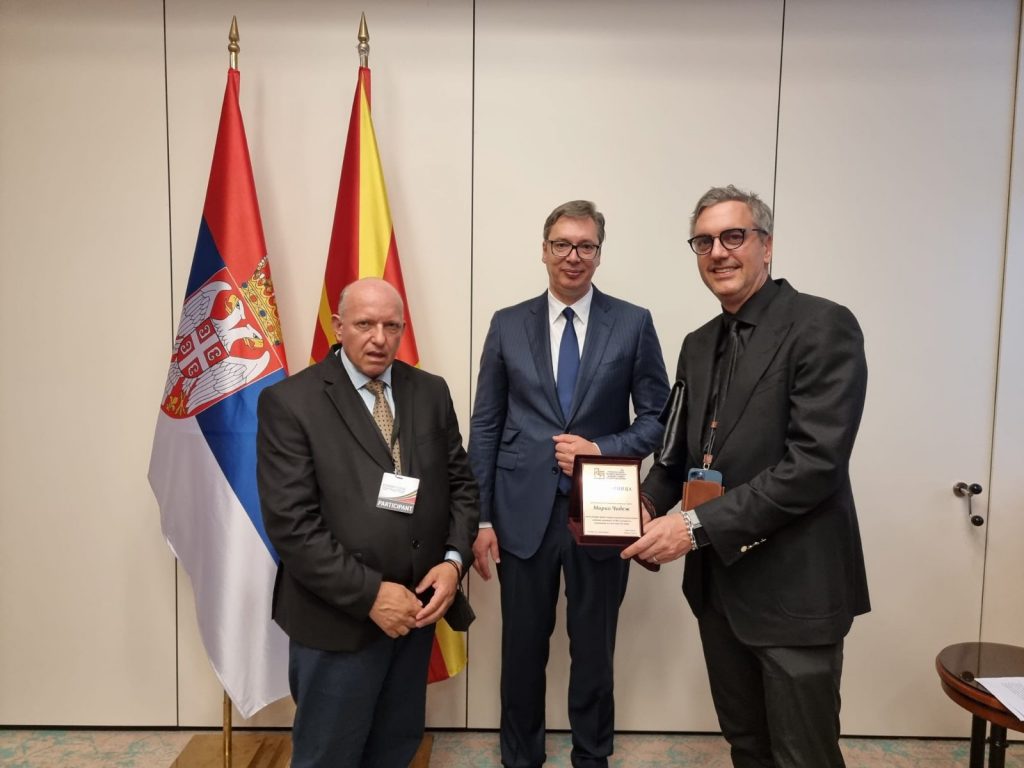A large regional economic forum was held in Macedonia, gathering about 350 companies from the Western Balkans.
A big regional economic forum was held in Skopje, attended by the Serbian President Aleksandar Vučić and the prime ministers of North Macedonia and Albania, Zoran Zaev and Edi Rama, respectively. The forum brought together about 350 companies from the Western Balkans. The President of Serbia noted that 217 companies from Serbia are participating in the Economic Forum. At the forum, the so-called Mini-Schengen initiative was renamed Open Balkans and three agreements have been signed aiming to improve the cooperation in the region. These are the Memorandum of Understanding on Cooperation in Facilitating the Import, Export and Movement of Goods in the Western Balkans, the Memorandum of Understanding on Cooperation in Relation to Free Access to the Western Balkan Labour Market and the Agreement on Cooperation in Disaster Protection in the Western Balkans.

The Prime Minister of North Macedonia, Zoran Zaev, stated that the Serbian, Albanian and Macedonian people share the same European values. “We are connecting so we can foster economic development, build a common economy, develop the region and secure a better life for each of our citizens. This initiative will be acknowledged and widely accepted in both Brussels and Washington. It can also make a strong contribution to the political relaxation in the region,” Mr Zaev pointed out.
The Prime Minister of Albania, Edi Rama, pointed out that we should not constantly look to the past. “This region will be a good example just like the European Union. We have a single goal and that is to restore four types of freedom – movement, people, capital and services. Today, we signed an agreement to work together under any circumstances and in any case if one of our three countries finds itself battling a natural disaster. If helicopters from all our countries join forces, that is the soul of this initiative,” Mr Rama said.
“We expect that, as of January 1, 2023, there will be no border between Serbia, North Macedonia and Albania”
Open Balkans – without barriers, waiting in lines and redundant red tape
The Economic Forum for Regional Cooperation was organized by the chambers of commerce of Serbia, North Macedonia and Albania.
On that occasion, the President of the Chamber of Commerce and Industry of Serbia, Marko Čadež, stated: “The Western Balkan economy has received strong political support to start building something new and different, namely, a region of success and trust, without barriers, unnecessary administration and waiting at borders. We expect that, as of January 1, 2023, there will be no border between Serbia, North Macedonia and Albania, and that job qualifications and work permits will be mutually recognized next year.”
Our goal, as he said, is no waiting in lines at the borders and companies operating more competitively in the region and the EU. “At the moment, trucks have to wait from 120 to 180 minutes to cross-regional borders and over 10 hours to cross into the EU. It is important to simplify the procedures for issuing work permits and to recognize each other’s qualifications because that will enable better mobility of the workforce and stop the migration of population abroad,” Mr Čadež added.
The presidents of the chambers of commerce of Albania and North Macedonia, Ines Mucostepa and Branko Azeski, respectively, also participated in the Skopje forum.
“A new era of cooperation between politics and business is beginning, but also a new era of cooperation between politics and politics, as well as business and business,” said Ms Mucostepa. “Our goal is for trucks to no longer have to wait in lines to cross a border and that such situation never repeats itself again,” Mr Azeski said. “It is important that we reach an agreement today to open the Balkans and unite business-wise,” added the president of the Chamber of Commerce of North Macedonia.

Recognition of the Macedonian Chamber of Commerce for vaccination in companies
The President of the Chamber of Commerce of North Macedonia, Branko Azeski, presented letters of thanks and awards to Serbia for helping with the successful vaccination of the business community and citizens of North Macedonia. The letter was received by the Serbian President Aleksandar Vučić and president of the Chamber of Commerce and Industry of Serbia (CCIS), Marko Čadež. At the end of March, the CCIS organized the vaccination of more than 10,000 business people from the region, and on that occasion, about 4,000 business people from Northern Macedonia were vaccinated, most of them in the Serbian town of Niš.
The big business forum in Skopje is jointly organized by the chambers of commerce of Serbia, North Macedonia and Albania, and together with the political leaders of the region, it had over 400 businesspeople in attendance.